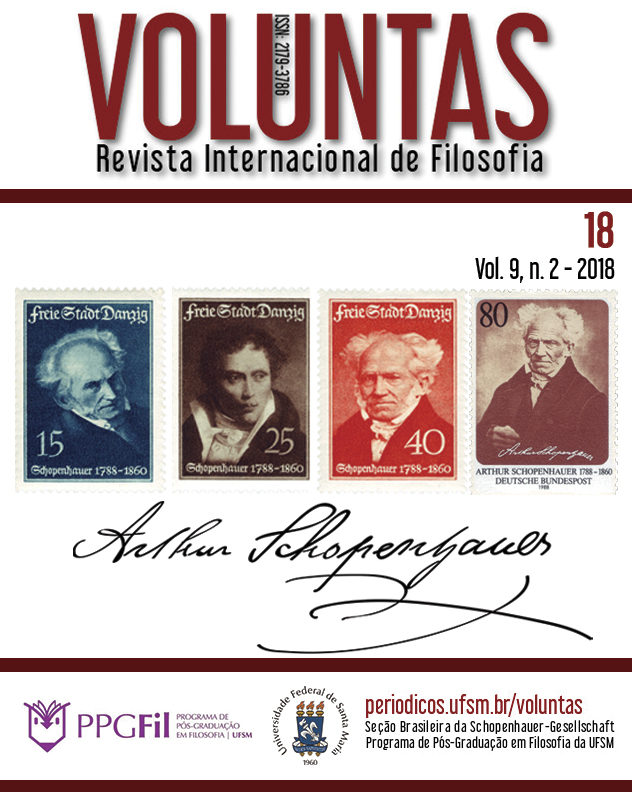Pessimism and politics: conservatism and social criticism based on Schopenhauer
DOI:
https://doi.org/10.5902/2179378636052Keywords:
Pessimism, Politics, Conservatism, History, SolidarityAbstract
The relationship between politics and pessimism, or more precisely, between the possibility of social and political change on the one hand, and the metaphysical rejection of that possibility on the other, has been striking in the reception of Schopenhauer's philosophy since the nineteenth century. On the one hand, a wide range of authors will mobilize pessimistic arguments that either coincide or are inspired by Schopenhauer to defend an immobilist and conservative perspective of politics and, on the other hand, several authors will use arguments present in the philosophy of Schopenhauer as a denunciation of the conditions of injustice in modern capitalist societies. For this reason, it is possible to emphasize both a "Schopenhauerian right" and a "Schopenhauerian left". In the present article, I will try to present a general picture of the reception of Schopenhauer's philosophy as far as the ideology is concerned. It is based on an analysis of the link between his pessimism and his political philosophy and leads to the various uses of pessimism made to justify the most diverse positions.
Downloads
References
BARBOZA, Jair. “Sabedoria de vida e práxis em Schopenhauer ou sobre uma possível “esquerda” schopenhaueriana”. In: Filosofia alemã de Kant a Hegel. Organização de Marcelo Carvalho e Vinicius Figueiredo. São Paulo: ANPOF, 2013.
BRANN, Henry Walter. Schopenhauer und das Judentum. Bonn: Bouvier Verlag, 1975.
CATTANEO, Mario. “Das Problem des Strafrechts im Denken Schopenhauers”, In: Schopenhauer Jahrbuch, n. 67, 1986, pp. 95-112.
CATTANEO, Mario. “Schopenhauers Kritik der Kantischen Rechtslehre” In: Schopenhauer Jahrbuch, nº 69, 1988, pp. 399-407.
COLIN, René-Pierre. Schopenhauer en France. Un mythe naturaliste. Lyon: Presses universitaires de Lyon, 1979, p. 128. Apud. COMPAGNON, A. Os antimodernos: De Joseph de Maistre a Roland Barthes. Belo Horizonte: Ed. UFMG, 2011.
COMPAGNON, Antoine. Os antimodernos: De Joseph de Maistre a Roland Barthes. Belo Horizonte: Ed. UFMG, 2011.
EBELING, H. e LÜTKHAUS, L. (orgs.), Schopenhauer und Marx: Philosophie des Elends, Elend der Philosophie? Königstein, Hain, 1980.
HAMLYN, D.W. “Eternal Justice”. In: Schopenhauer Jahrbuch, nº 69, 1988, pp. 281-288.
HORKHEIMER, Max. Materialismo e Metafísica. In: Teoria Crítica I, Trad. de Hilde Cohn, São Paulo: Perspectiva, 2006.
HORKHEIMER, Max. “Schopenhauer und die Gesellschaft”, In: Schopenhauer Jahrbuch no 36, Frankurt am Main, 1955, pp. 49-57.
HORKHEIMER, Max. “Die Aktualität Schopenhauers”, In: Schopenhauer Jahrbuch, no 42, Frankurt am Main, pp. 12-25, 1961.
KROON, Annette Godart-van der. “Schopenhauer’s Theory of Justice and its Implication to Natural Law”. In: Schopenhauer Jahrbuch, nº 84, 2003, pp. 121-145.
KÜPPER, Georg. “Der Begriff des Unrechts bei Schopenhauer”. In: Schopenhauer Jahrbuch, nº 74, 1993, pp. 103-114.
LOSURDO, Domenico. Nietzsche: o rebelde aristocrata: biografia intelectual e balanço crítico. Trad. Jaime A. Clasen. Rio de Janeiro: Revan, 2009.
LÖWITH, Karl. De Hegel à Nietzsche. Gallimard, Paris, 1969.
LUKÁCS, Georg. Schopenhauer. In: EBELING, H.; LÜTKHAUS, L. (orgs.) Schopenhauer und Marx: Philosophie des Elends, Elend der Philosophie? Königstein: Hain, 1980.
LUKÁCS, Georg. El Asalto a la Razón. Trad. de Wenceslao Roces. Barcelona, Grijalbo, 1976.
LUKÁCS, Georg. História e Consciência de classe. Trad. de Rodnei Nascimento. São Paulo: Martins Fontes, 2003.
LÜTKEHAUS, Ludger. Einleitung II: Pessimismus und Praxis. Umrisse einer kritischen Philosophie des Elends. In: EBELING, H.; LÜTKEHAUS, L (Orgs.). Schopenhauer und Marx: Philosophie des Elends - Elend der Philosophie?. Königstein/Ts.: Hain, 1980, pp. 23-39.
LÜTKEHAUS, Ludger. „Esiste una sinistra schopenhaueriana? Ovvero: il pessimismo è un quietismo?” In: FAZIO, D.; KOßLER, M.; LÜTKEHAUS, L. (Orgs.). Arthur Schopenhauer e la sua scuola: Lecce: Pensa Multimedia, 2007.
MAINLÄNDER, Phillip. Philosophie der Erlösung. In: ______. Schriften, org. por Winfried Müller-Seyfarth, Hildesheim, Zürich, New York, Olms Verlag, 4 vols, 1996.
MÜNKLER, Herfried. “Ein janusköpfiger Konservatismus: Arthur Schopenhauers politische Ideen”. In: Spierling, V. (org). Schopenhauer im Denken der Gegenwart. Munique: Piper, 1987, pp. 217-237.
PAUEN, Michael. Pessimismus: Geschichtsphilosophie, Metaphysik und Moderne von Nietzsche bis Spengler. Akademie Verlag, Berlin, 1997.
POST, W. Kritische Theorie und metaphysischer Pessimismus. Zum Spätwerk Max Horkheimers. München: Kösel Verlag, 1971.
ROSSET, Clément. Schopenhauer, Philosophe de L’absurde. Paris: PUF, 1967.
SCHOPENHAUER, Arthur. Sämtliche Werke. Editadas e comentadas criticamente por Arthur Hübscher, Wiesbaden, F. A. Brockhaus, 7 vols, 1972.
SCHOPENHAUER, Arthur. Parerga und Paralipomena. Zurique: Haffmans, 2 vols, 1988.
SCHOPENHAUER, Arthur. Sobre o Fundamento da Moral. Tradução de Maria Lúcia Cacciola, São Paulo, Martins Fontes, 1995.
SCHOPENHAUER, Arthur. Sobre a ética. (Capítulos 8 – 15 de Parerga e Paralipomena de Arthur Schopenhauer). Organização e tradução de Flamarion C. Ramos. São Paulo: Hedra, 2012.
SCHOPENHAUER, Arthur. O Mundo como Vontade e como Representação. Primeiro tomo. Tradução de Jair Barboza. 2ª. edição, São Paulo: Unesp, 2015a.
SCHOPENHAUER, Arthur. O Mundo como Vontade e como Representação. Segundo tomo: Suplementos aos quatro livros do primeiro tomo Tradução de Jair Barboza. São Paulo: Unesp, 2015b.
Downloads
Published
How to Cite
Issue
Section
License
The submission of original manuscripts to this journal implies the transference, by the authors, of the copyrights for printed and digital publication. The copyrights of a published manuscript belong ultimately to the author, and only the copyright for its first publication is reserved to the journal. Authors may only use the same results in other publications explicitly indicating this journal as the medium of the original publication.
Licence
Attribution-NonCommercial-ShareAlike 4.0 International (CC BY-NC-SA 4.0) - This license lets others remix, tweak, and build upon your work non-commercially, as long as they credit you and license their new creations under the identical terms.






